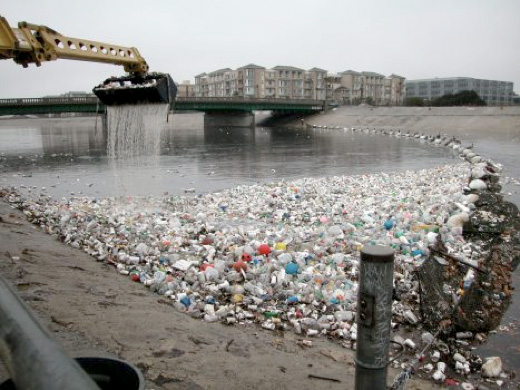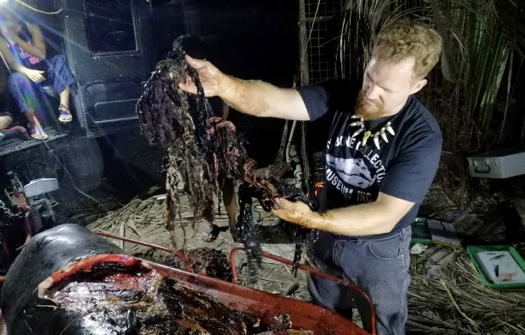[Source: The Mercury News] With enormous and ever-growing amounts of plastic washing into oceans, rivers and lakes around the world, California lawmakers this week are considering passing the nation’s most far-reaching laws to reduce plastic pollution over the next decade.
Three bills before the state Legislature would require companies that sell products widely found in grocery stores and fast-food restaurants to shoulder much of the burden for cutting the amount of plastic waste. The proposed legislation is drawing praise from environmental groups, who say it is long overdue and will set an example for other states to follow. But it is opposed by industry groups, who argue the measures are costly and unfairly broad.
When it comes to plastic pollution, the facts are dramatic and depressing.
Half the plastic that has ever existed on Earth was made in the last 13 years. Only 9% of the plastic sold every year in the United States is recycled. Up to 13 million metric tons of it ends up in the world’s ocean each year — the equivalent of a garbage truck-full being dumped into the sea every minute — where it kills fish, birds, sea turtles, whales and dolphins that eat it or become entangled by it.
Plastic lasts for hundreds of years. Making it consumes large amounts of petroleum products, which contributes to climate change. And at the current rate, one recent study found there will be more plastic by weight in the ocean in 2050 than fish, most of it broken into trillions of tiny pieces of toxic confetti.

“Californians want to recycle,” said Mark Murray, executive director of Californians Against Waste, a group supporting the bills. “They want to take responsibility for our waste stream. But the market conditions don’t exist to recycle a lot of these materials. We need manufacturers to step up and take responsibility.”
However, industry groups, especially large companies that make food and personal care products, say the bills go too far and would unfairly burden them with a costly problem when the government and the public should share in the solutions.
“We oppose the bills primarily because of the massive bureaucracy that they would set on top of our broken recycling system,” said John Hewitt, senior director of state affairs for the Grocery Manufacturers Association, which represents large food, beverage and consumer product companies. “There’s not a shared responsibility.”
The deadline is Friday for all bills in the state Capitol in Sacramento to pass or die for the year.
At the center of the plastics debate are two measures, AB 1080, by Assemblywoman Lorena Gonzalez, D-San Diego, and SB 54, by state Sen. Ben Allen, D-Santa Monica.
Widely considered the most significant environmental legislation of 2019 in California, the companion bills, if they pass and are signed by Gov. Gavin Newsom, would require two fundamental changes in California law.
First, starting on Jan. 1, 2030, all single-use packaging and food products — including plates, straws, forks, spoons, knives, cups and bowls that are offered for sale, sold, or imported into California — would have to be recyclable or made of materials that decompose when composted.
Lots of existing containers, including aluminum cans, glass bottles and plastic that can be easily recycled, such as #1 plastic bottles, already meet that standard.
But many items don’t. Products that currently can’t be recycled, such as Styrofoam food containers in take-out restaurants or milk cartons and juice boxes made of plastic-coated paper, would be banned for sale in California, unless the companies selling them set up systems to take back or recycle them or make them in a way that they can be composted.
Second, the bills also would require a 75% reduction of the waste generated from single-use packaging in California by 2030. That could come through recycling, composting or reduction in the amount of packaging. A state agency, CalRecycle, would have until 2024 to draft the specific rules.
Supporters of the bills include most of California’s major environmental groups, including the Sierra Club, Audubon California, Natural Resources Defense Council and Oceana. The proposals also have been endorsed by the California Coastal Commission, the Monterey Bay Aquarium and numerous cities, including Los Angeles, San Diego, Half Moon Bay, Alameda and others.
Opponents include the California Chamber of Commerce, the Chemical Industry Council of California, the Grocery Manufacturers Association, the Plastic Shipping Container Institute and other industry groups.
Critics of the bills say many of the large companies already are working toward the goal. Eighty percent of the 25 largest consumer packaging companies have committed to making 100 percent of their packaging recyclable or compostable by 2030, including the five largest — Nestle, Procter & Gamble, PepsiCo, Unilever and Anheuser Busch — which have set 2025 as their target date.
“We’re not opposed to taking responsibility,” said Hewitt, adding “but these bills are missing the mark.”

Some industry groups are attempting to keep a low profile.
Novolex Holdings, a company based in South Carolina that manufactures plastic bags, is funding a group called “Californians for the Environment and Recycling” to build opposition to the bills.
On the group’s website, readers are warned that phasing out plastic “could cause public health issues” and the bills “will make most modern products inaccessible.”
“Californians will have to prepare for a future without toothpaste, baby formula, and dog food,” the website adds.
Novolex spent at least $2.7 million on Proposition 67, an unsuccessful ballot measure in 2016 that would have overturned a statewide ban on plastic grocery bags signed by former Gov. Jerry Brown.
Supporters of the bills call the claims misleading.
“The devil is in the details. We’ve been working out those details,” said Gonzalez at a rally outside the state capitol building last month. “Not everybody will be happy, because nobody likes to be told what to do when they are making money off of trash. But it’s time we hold manufacturers responsible to use recycled and reclaimed products, and it’s time we are all part of the solution.”
A third bill, AB 792, by Assemblyman Phil Ting, D-San Francisco, would require that plastic beverage containers contain 10% recycled plastic by 2021, 25% recycled plastic by 2025, and 50% recycled plastic by 2030.
All three of the bills have passed at least one of the two legislative chambers so far, largely with Democrats voting in favor and Republicans voting against.
In recent months, California’s recycling system has been thrown into disarray.
Last year, China announced that it would no longer accept large amounts of plastic and other materials recycled in the United States for processing. The Chinese set a much stricter standard for purity in the recycled materials, meaning that Chinese officials will not allow them into the country if there is food waste or other contamination, even in very small amounts.
That caused a huge glut of of waste plastic and other materials in California. A few other Asian countries began buying more, but overall prices fell. Some cities have had to pay to get rid of plastic left in blue recycling bins by residents. Others have put the materials into landfills.
In August, rePlanet, one of the state’s largest recycling businesses, closed 284 collection centers across the state.
“Single-use plastic items are destroying our oceans, marine life, and the broader environment, and harming human health,” said Allen. “Cities are forced to spend millions of taxpayer dollars on waste management and cleanup that could be used for other essential services. It is time for California to take this crisis seriously.”
Source: The Mercury News
September 11, 2019


